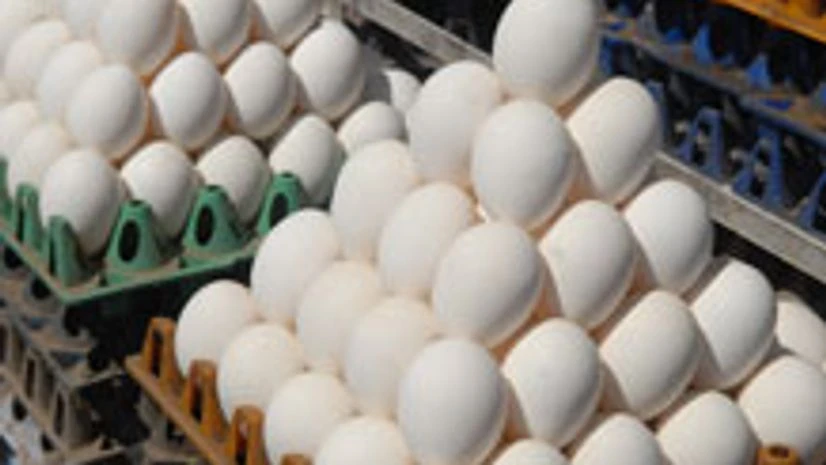Despite a stable demand for eggs and a prolonged winter this year, their prices have been falling. From Rs 400 for 100 eggs three months earlier, it is now Rs 290-320 in various parts of the country, on the lower side of the range in the north and higher in the south.
According to the Hyderabad-based National Egg Coordination Committee (NECC), the average farmgate price in Andhra Pradesh for every 100 eggs was Rs 322 in February, against an average of Rs 370 in January and Rs 386 in December. In Haryana on Tuesday, it was Rs 290 for 100 eggs.
“The fall in prices of vegetables in the past few months could have made people consume more of those, partly contributing to the fall in egg prices,” said a senior NECC official.
Prices, he said, exhibit volatility during March-June, due to a demand oscillation of 20 per cent. For farmers to break even, prices have to stay well above Rs 300 (for every 100 units), he added. The per capita demand in India has been 48-50 eggs for about five years. Stability in the cost of poultry feed has helped farmers combat the fall in egg prices. With summer round the corner, they don’t expect a revival in the price; consumption falls in this season. During March-April, prices come under pressure due to a fall in demand, recovering slightly in May; from June, they start to stabilise.
Subramanyam, an NECC coordinator in Chittoor (Andhra), said with good returns in the past three months and news of an extended winter in North India, many farmers did not opt for culling the birds for chicken supply in February, which led to some rise in supply of eggs. Confirming this, a farmer in East Godavari district said there was 10 per cent more supply this time.
“The poultry sector is predominantly unorganised and can be easily subjected to price volatility by a bunch of traders and wholesalers,”said Atul Mahajan, managing director of papaak.com, a poultry prices monitor.
Due to absence of cold storage facilities and the short shelf-life of eggs, many farmers lost money every year, he added.
In 2013, as against an average of Rs 340 for 100 eggs in February, prices dropped to Rs 250 in May.
During this period, many farmers suffered losses but counted on winter demand to cover the losses. Andhra Pradesh Poultry Federation president D Sudhakar said farmers would incur losses if prices fell substantially during March-May.
According to the Hyderabad-based National Egg Coordination Committee (NECC), the average farmgate price in Andhra Pradesh for every 100 eggs was Rs 322 in February, against an average of Rs 370 in January and Rs 386 in December. In Haryana on Tuesday, it was Rs 290 for 100 eggs.
“The fall in prices of vegetables in the past few months could have made people consume more of those, partly contributing to the fall in egg prices,” said a senior NECC official.
Prices, he said, exhibit volatility during March-June, due to a demand oscillation of 20 per cent. For farmers to break even, prices have to stay well above Rs 300 (for every 100 units), he added. The per capita demand in India has been 48-50 eggs for about five years. Stability in the cost of poultry feed has helped farmers combat the fall in egg prices. With summer round the corner, they don’t expect a revival in the price; consumption falls in this season. During March-April, prices come under pressure due to a fall in demand, recovering slightly in May; from June, they start to stabilise.
Subramanyam, an NECC coordinator in Chittoor (Andhra), said with good returns in the past three months and news of an extended winter in North India, many farmers did not opt for culling the birds for chicken supply in February, which led to some rise in supply of eggs. Confirming this, a farmer in East Godavari district said there was 10 per cent more supply this time.
“The poultry sector is predominantly unorganised and can be easily subjected to price volatility by a bunch of traders and wholesalers,”said Atul Mahajan, managing director of papaak.com, a poultry prices monitor.
Due to absence of cold storage facilities and the short shelf-life of eggs, many farmers lost money every year, he added.
In 2013, as against an average of Rs 340 for 100 eggs in February, prices dropped to Rs 250 in May.
During this period, many farmers suffered losses but counted on winter demand to cover the losses. Andhra Pradesh Poultry Federation president D Sudhakar said farmers would incur losses if prices fell substantially during March-May.

)
